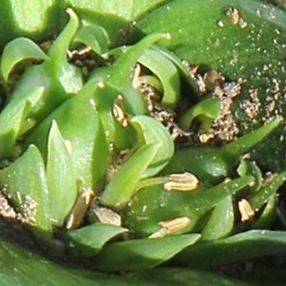
| Main centres: | 1-3 business days |
| Regional areas: | 3-4 business days |
| Remote areas: | 3-5 business days |

Androcymbium cuspidatum Seeds
Cup and a Saucer, Men-in-a-boat; Bobbejaanskoen

Androcymbium cuspidatum is a South African endemic species from the Northern Cape Province. It has prostrate leaves that are 5cm long. It produces its flowers from winter to early spring. Large bracts surround the flowers. It is also known as Colchicum cuspidatum. The name is derived from the Greek words, aner, man, and kumbion, cup. Species of the genus Androcymbium are short-stemmed or stemless reaching a height of 15cm. All species have an ovoid corm (a corm unlike a bulb, is a stem that is swollen and modified for storage, flattened on top and slightly concave on the bottom: when upon being cut, the corm appears solid). It has a fan-like, basal fold, and is covered with dark leathery to woody tunics. Leaves are few to several, scattered along the stem; in a stemless species, they are congested and often prostrate, ovate to linear-lanceolate, clasping below, parallel-veined, often with a distinct midrib; when broad, the leaves are arching. They have a soft leathery texture and the margins are sometimes crisped and smooth or ciliolate or bristly. The inflorescence is single to few-flowered, bracteate and usually forming a congested raceme; the bracts are leaf-like or broader and often coloured or patterned, the inner bracts are successively smaller. The flowers are found at the base of the bract and are usually green-white. There are six tepals (rarely 7–12), whiare not joined to form a tube. They have a swollen yellow nectary at the base. The six stamens are attached to the lower part of the tepals. The ovary is cylindrical; deeply lobed, has three free styles and many ovules per locule. The fruit is an ovoid septicidal capsule. Most of the Cape species have curious, cupped tepal limbs, which hold the nectar, and often broad, colourful floral bracts that resemble large petals, which envelope the small flowers. The bulb of Androcymbium has been found to be toxic, yet it has been used medicinally by the Southern Sothos as ointment for the sore ears. The plant is believed to be a charm to stop the enemy in wars.
